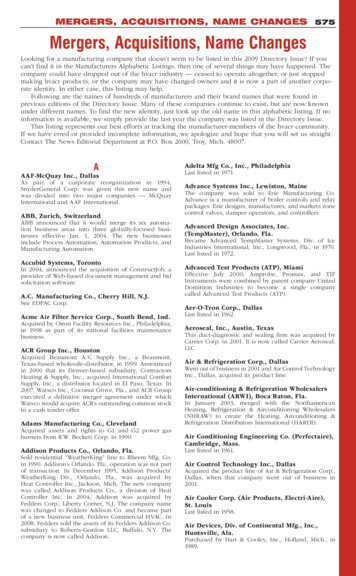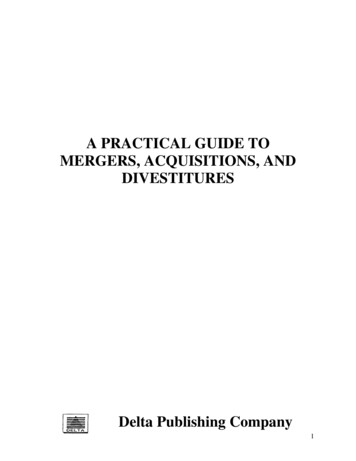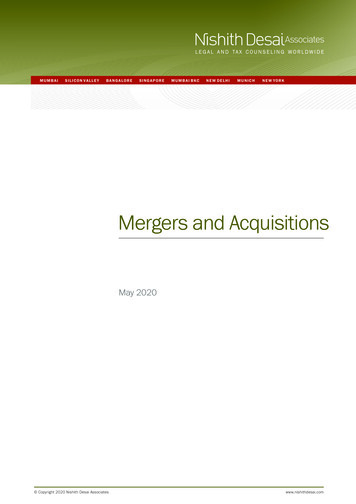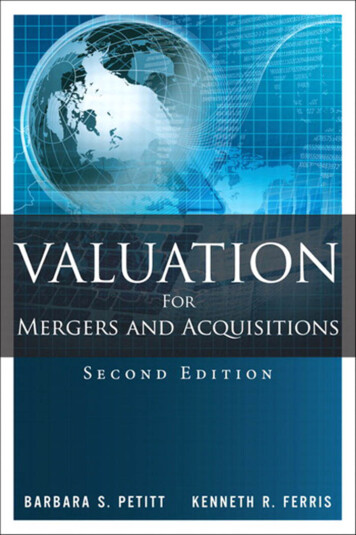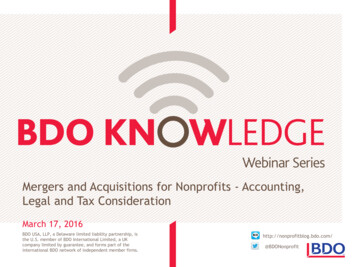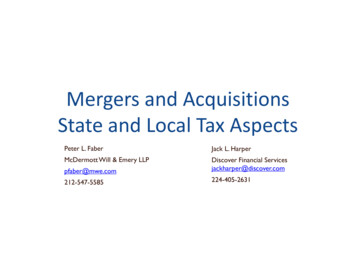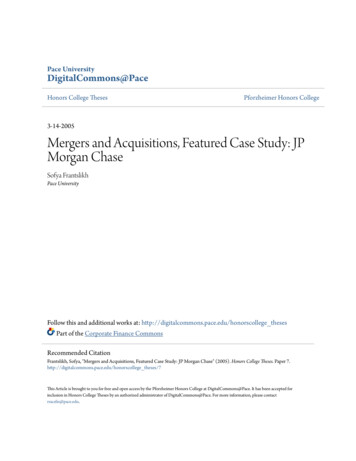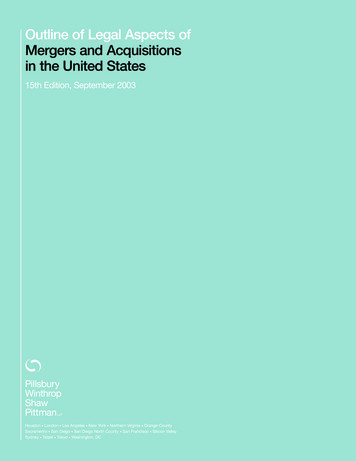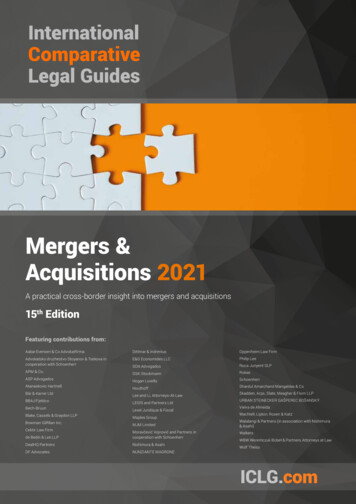
Transcription
Mergers &Acquisitions 2021A practical cross-border insight into mergers and acquisitions15th EditionFeaturing contributions from:Aabø-Evensen & Co AdvokatfirmaDittmar & IndreniusOppenheim Law FirmAdvokatsko druzhestvo Stoyanov & Tsekova incooperation with SchoenherrE&G Economides LLCPhilip LeeGDA AdvogadosRoca Junyent SLPGSK StockmannRokasHogan LovellsSchoenherrHouthoffShardul Amarchand Mangaldas & CoAPM & Co.ASP AdvogadosAtanaskovic HartnellBär & Karrer LtdBBA//FjeldcoBech-BruunBlake, Cassels & Graydon LLPLee and Li, Attorneys-At-LawLEGIS and Partners LtdLexel Juridique & FiscalMaples GroupSkadden, Arps, Slate, Meagher & Flom LLPURBAN STEINECKER GAŠPEREC BOŠANSKÝVieira de AlmeidaWachtell, Lipton, Rosen & KatzMJM LimitedWalalangi & Partners (in association with Nishimura& Asahi)de Bedin & Lee LLPMoravčević Vojnović and Partners incooperation with SchoenherrWalkersDealHQ PartnersNishimura & AsahiDF AdvocatesNUNZIANTE MAGRONEBowman Gilfillan Inc.Cektir Law FirmWBW Weremczuk Bobeł & Partners Attorneys at LawWolf Theiss
Table of ContentsExpert Chapters1Global M&A Trends in 2020Scott C. Hopkins, Adam Howard & Craig Kelly, Skadden, Arps, Slate, Meagher & Flom LLP4M&A Lessons from the COVID CrisisAdam O. Emmerich & Trevor S. Norwitz, Wachtell, Lipton, Rosen & KatzQ&A Chapters9AngolaVieira de Almeida / ASP Advogados: Susana AlmeidaBrandão & Hugo Sipitali14316AustraliaAtanaskovic Hartnell: Lawson Jepps & Jia-Lee Lim14924AustriaSchoenherr: Christian Herbst & Sascha Hödl15735BermudaMJM Limited: Jeremy Leese & Brian Holdipp42British Virgin IslandsWalkers: Matthew Cowman & Patrick Ormond495867BulgariaSchoenherr (in cooperation with Advokatskodruzhestvo Stoyanov & Tsekova): Ilko Stoyanov &Katerina KaloyanovaCanadaBlake, Cassels & Graydon LLP: Markus Viirland &Richard TurnerCayman IslandsMaples Group: Nick Evans, Suzanne Correy & LouiseCowley165172192MaltaDF Advocates: Dr. Maria Paloma Deguara & Celia Mifsud20989DenmarkBech-Bruun: Steen Jensen & David Moalem96FinlandDittmar & Indrenius: Anders Carlberg & Jan OllilaHong Kongde Bedin & Lee LLP: Claudio de Bedin & Helen Morris120127134HungaryOppenheim Law Firm: József Bulcsú Fenyvesi &Mihály BarczaJapanNishimura & Asahi: Tomohiro Takagi & KeiichiroYamanakaMadagascarLexel Juridique & Fiscal: Tafita RatsimbaCzech RepublicWolf Theiss: Tereza Naučová & Michal Matouš112ItalyNUNZIANTE MAGRONE: Fiorella Alvino & FabioLiguori18781GreeceRokas: Viktoria Chatzara & Kosmas KaranikolasIsraelAPM & Co.: Ian Rostowsky, Stephen Barak Rozen &Elinor PolakLuxembourgGSK Stockmann: Marcus Peter & Kate Yu Rao200104IrelandPhilip Lee: John Given & Andreas McConnell181CyprusE&G Economides LLC: Virginia Adamidou & GeorgeEconomides74IndonesiaWalalangi & Partners (in association with Nishimura& Asahi): Miriam Andreta & Siti Kemala Nuraida217224233240IcelandBBA//Fjeldco: Stefán Reykjalín255IndiaShardul Amarchand Mangaldas & Co: RaghubirMenon, Sakshi Mehra & Dipayan Bhattacherjee262MauritiusLEGIS and Partners Ltd: Bertrand Betsy, CarolineSamy & Zahraa AuchoyburMontenegroMoravčević Vojnović and Partners in cooperationwith Schoenherr: Slaven Moravčević & Miloš LakovićMozambiqueVieira de Almeida / GDA Advogados: GuilhermeDaniel & Susana Almeida BrandãoNetherlandsHouthoff: Alexander J. Kaarls & Willem J.T.LiedenbaumNigeriaDealHQ Partners: Orinari Jeremy Horsfall & AdefereAdeyemoNorwayAabø-Evensen & Co Advokatfirma: Ole KristianAabø-EvensenPolandWBW Weremczuk Bobeł & Partners Attorneys atLaw: Łukasz BobełPortugalVieira de Almeida: Jorge Bleck & Domingos Freire deAndrade
Table of Contents270278SerbiaMoravčević Vojnović and Partners in cooperationwith Schoenherr: Matija Vojnović & Vojimir KurtićSlovakiaURBAN STEINECKER GAŠPEREC BOŠANSKÝ:Marián Bošanský & Juraj Steinecker284SloveniaSchoenherr: Vid Kobe & Bojan Brežan295South AfricaBowman Gilfillan Inc.: Ezra Davids & Ryan Kitcat303SpainRoca Junyent SLP: Natalia Martí Picó & Xavier Costa310318325334342SwitzerlandBär & Karrer Ltd: Dr. Mariel HochTaiwanLee and Li, Attorneys-At-Law: James Huang & EddieHsiungTurkeyCektir Law Firm: Berk Çektir & Uğur KaracabeyUnited KingdomHogan Lovells: Ben Higson, Sarah Shaw, JohnConnell & John HolmeUSASkadden, Arps, Slate, Meagher & Flom LLP: AnnBeth Stebbins & Thad Hartmann
Chapter 10Nick EvansSuzanne CorreyMaples Group121.1Relevant Authorities and LegislationWhat regulates M&A?The primary sources of regulation of M&A in the Cayman Islandsare the Companies Act (2020 Revision) (the “Companies Act”)and common law.Part XVI of the Companies Act facilitates mergers and consolidations between one or more companies, provided that at leastone constituent company is incorporated under the CompaniesAct. The Limited Liability Companies Act (2020 Revision) (the“LLC Act”) also provides for a similar framework for CaymanIslands limited liability companies.In addition: mergers, amalgamations and reconstructions by way of ascheme of arrangement approved by the requisite majoritiesof shareholders and creditors and by an order of the CaymanIslands court under section 86 or 87 of the Companies Actare still available for complex mergers (and are mirrored inthe LLC Act); and section 88 of the Companies Act provides a limitedminority squeeze-out procedure (and, again, is mirrored inthe LLC Act).The Cayman Islands does not have a prescriptive set of legalprinciples specifically relevant to “going private” and otheracquisition transactions (unlike other jurisdictions such as, forexample, Delaware). Rather, broad common law and fiduciaryprinciples will apply.While there are no specific statutes or government regulationconcerning the conduct of M&A transactions, where the targetcompany’s securities are listed on the Cayman Islands StockExchange (“CSX”), the CSX Code on Takeovers and Mergersand Rules Governing Substantial Acquisitions of Shares (the“Code”), which exists principally to ensure fair and equal treatment of all shareholders, may apply.1.2 Are there different rules for different types ofcompany?Except to the extent described above with respect to companiesMergers & Acquisitions 2021Louise Cowleylisted on the CSX, there are no different rules for different typesof company.1.3Are there special rules for foreign buyers?There are no foreign investment restrictions or exchange controllegislation in the Cayman Islands. However, any company withan established physical presence in the Cayman Islands must bestructured so as to comply with local licensing laws, includingwith respect to ownership. Any company engaging in businesslocally requires to be licensed under the Trade and BusinessLicensing Act (2019 Revision) and the applicant must either bebeneficially owned and controlled at least 60% by persons ofCaymanian Status, or hold a licence under the Local Companies(Control) Act (2019 Revision). However, foreign investment, ifconsidered beneficial to the Cayman Islands’ economy, is generally encouraged.1.4Are there any special sector-related rules?There are change-of-control rules applicable to entities regulated by the Cayman Islands Monetary Authority under theBanks and Trust Companies Act (2020 Revision), the InsuranceAct, 2010 or (with respect to licensed mutual fund administrators) the Mutual Funds Act (2020 Revision). In addition, ownership and control restrictions apply to certain entities regulatedby the Information and Communications Technology Act (2019Revision).1.5What are the principal sources of liability?Pursuant to common law rules, the directors of Cayman Islandscompanies owe fiduciary duties (generally described as beingthose of loyalty, honesty and good faith) to the company. Whileit is common for directors of Cayman Islands companies to beindemnified for certain breaches of this duty, as a matter ofpublic policy, it is not possible for directors to be indemnifiedfor conduct amounting to wilful default, wilful neglect, actualfraud or dishonesty.Cayman IslandsCayman Islands67
68Cayman IslandsTo the extent that consent to a merger or acquisition isprocured via an information memorandum or proxy statement, civil liability in tort may arise for negligent misstatementor fraudulent misrepresentation. In addition, the ContractsAct (1996 Revision) gives certain statutory rights to damagesin respect of negligent misstatements. There are certain criminal sanctions under the Penal Code (2019 Revision) for deceptive actions, including for any officer of a company (or personpurporting to act as such) with intent to deceive members orcreditors of the company about its affairs, who publishes orconcurs in publishing a written statement or account that, totheir knowledge, is or may be misleading, false or deceptive in amaterial particular.Any disposition of property made at an undervalue by or onbehalf of a Cayman Islands company and if an intent to defraudits creditors, shall be voidable: (i) under the Companies Act atthe instance of the company’s official liquidator; or (ii) under theFraudulent Dispositions Act (1996 Revision) at the instance of acreditor thereby prejudiced.If the consideration is to be shares in a Cayman Islandscompany, the Companies Act prohibits an exempted companythat is not listed on the CSX from making any invitation to thepublic in the Cayman Islands to subscribe for any of its securities.222.1Mechanics of AcquisitionWhat alternative means of acquisition are there?Statutory mergers are by far the most common method of structuring a more complex acquisition or business combination. Incertain cases, however, the statutory merger regime may not besuitable, and alternative options, such as contractual equity orasset acquisition, are appropriate. The threshold for a statutorymerger (subject to the relevant constitutional documents of thecompany) requires only a special resolution passed in accordancewith the articles of association (typically, a two-thirds majorityof those shareholders attending and voting at the relevantmeeting). Dissenters in a merger have the right to be paid incash the fair value of their shares and may compel the companyto institute court proceedings to determine that fair value. Thiscan be a factor where the offer involves a share-for-share swapas opposed to a cash buyout, or where the bidder anticipatesissues with minority shareholders.Schemes of arrangement under section 86 or 87 of theCompanies Act are appropriate in certain circumstances, suchas where a capital reduction is required as part of the acquisition structure. A scheme of arrangement transaction willinvolve the production of a circular, typically a detailed disclosure document that must provide stakeholders with all information required to make an informed decision on the merits of theproposed scheme. The principal benefit of a scheme is that ifall the necessary majorities are obtained and hurdles are cleared,and the court approves the scheme, then the terms of thescheme become binding on all members of the relevant class(es)of shareholders or creditors, whether or not they: (a) receivednotice of the scheme; (b) voted at the meeting; (c) voted for oragainst the scheme; and (d) changed their minds afterwards.In a tender offer, private contractual acquisition, or publictakeover, where control of the majority of the voting equity isrequired, the statutory squeeze-out remains available where therelevant statutory thresholds are met. Where a bidder has acquired90% or more of the shares in a Cayman Islands company, it cancompel the acquisition of the shares of the remaining minorityshareholders, and thereby become the sole shareholder. Such a“squeeze-out” requires the acceptance of the offer by holdersof no less than 90% in value of the shares to which the offerrelates, excluding shares held or contracted to be acquired priorto the date of the offer. Shares held by the bidder or its affiliatesare typically not counted for purposes of the 90% requirement.Dissenters have limited rights to object to the acquisition, and inthe case of a tender offer that is not on an exclusively cash basis,dissenters have no right to compel a cash alternative.Contractual asset acquisitions, where the target ceases doingbusiness and is liquidated after the consummation of the sale,are becoming less popular given the flexibility and ease of use ofthe statutory merger regime, but remain a useful option.2.2 What advisers do the parties need?Parties should engage Cayman Islands counsel alongside onshorelegal advisers. Generally, auditors, tax and financial advisers arealso involved in deal structuring.2.3How long does it take?Depending on the complexity of the transaction, the structureand regulatory status of the target, and the method employed,anywhere from a matter of weeks to a number of months. Forexample, straightforward mergers of Cayman Islands companies, where the shareholder base is relatively limited, and wherethere are no secured creditors and no applicable public listing,may be accomplished in a few weeks. Where the target companyis listed (either in the Cayman Islands or elsewhere) or the mergeris a cross-border transaction, a longer deal time is required.Schemes of arrangements can, depending on their complexityand given the requirements for court approval, run for manymonths, as can complex merger transactions.2.4What are the main hurdles?Both a statutory merger and a squeeze-out transaction providefor certain dissenter rights, which, in the merger context, essentially provide for dissenting shareholders to make application tothe court for the payment of fair value for their shares. Similarconsiderations apply for statutory squeeze-outs; however, wherethere is a tender offer that is not on an exclusively cash basis,dissenters have no right to compel a cash alternative. Forschemes of arrangement, the key challenge is achieving the highapproval majorities required of each class of shareholders.2.5 How much flexibility is there over deal terms andprice?Parties are generally free to contract as they wish with regardto terms and price, subject to the directors of a Cayman Islandscompany discharging their fiduciary duties, including the dutyto act bona fide in the best interests of the company.2.6 What differences are there between offering cashand other consideration?Again, parties are generally free to contract as they wish withregard to terms and price. However, in the context of a statutorymerger, where dissenters have the right to be paid in cash the fairvalue of their shares, a share-for-share deal may add complexity.Mergers & Acquisitions 2021
Maples Group2.7 Do the same terms have to be offered to allshareholders?Where an acquisition is structured by way of a statutory mergeror scheme of arrangement, differing consideration can be paid toshareholders. For tender offers utilising a statutory squeeze-out,the same “offer” must be made to all shareholders.2.8 Are there obligations to purchase other classes oftarget securities?There are no statutory or common law obligations to purchaseother classes of target securities.2.9 Are there any limits on agreeing terms withemployees?There are no such limits applicable under Cayman Islands law.2.10 What role do employees, pension trustees andother stakeholders play?Aside from a general consideration with respect to the relevantemployment contracts, there are no employee or pension-specificprovisions applicable to a statutory merger, save that where thesurviving company is a Cayman Islands company, it assures allcontracts, obligations, claims, debts and liabilities of each of theother constituent companies, including any employment liabilities. Secured creditor consent to a statutory merger is required.For a scheme of arrangement, again, there are no specificemployee or pension-specific provisions applicable, but where therights of creditors are to be affected, their consent will be required.Employee, pension or creditor consideration will not be relevantto a tender offer or statutory squeeze-out, or to an asset acquisition.2.11 What documentation is needed?While not strictly prescribed by the Companies Act, any complexmerger will require some form of disclosure statement, whetheror not required by applicable onshore listing rules or regulation. The Companies Act requires each Cayman Islands constituent company to enter into a written plan of merger, setting outcertain prescribed information, and for more complex transactions, this is usually accompanied by a long-form merger orframework agreement.For schemes of arrangement, alongside the applicable courtdocuments, the scheme circular must be provided to the schemeparticipants, including sufficient information so as to allowthem to make an informed decision in relation to the merits ofthe proposed scheme.For a tender offer, there is no Cayman Islands prescribeddocumentation, but again, onshore listing rules or regulationmay be applicable. For a statutory squeeze-out, the CompaniesAct requires that notice be given to dissenting shareholders.For an asset acquisition, there are no specific documentationrequirements, and the parties are free to contract as they see fit.2.12 Are there any special disclosure requirements?For schemes of arrangement, the scheme circular must beprovided to the scheme participants, and must include sufficientMergers & Acquisitions 2021information so as to allow them to make an informed decisionin relation to the merits of the proposed scheme. For statutory mergers, the plan of merger must contain certain limitedprescribed information and be approved by a special resolutionof the members of each Cayman Islands constituent company.2.13 What are the key costs?The key costs will be service provider fees; government filingfees will generally be minimal and Cayman Islands stamp duty isonly payable on documents that are executed in, or subsequentlybrought to, the Cayman Islands. Additional costs may also beincurred if the target is obliged to petition the Cayman Islandscourt in connection with dissenting shareholders. For schemesof arrangement, court fees will also be incurred.2.14 What consents are needed?Other than those as set out at question 1.4 above, there aregenerally no authorisations, consents, approvals, licences, validations or exemptions required by law from any governmentalauthorities or agencies or other official bodies in the CaymanIslands in connection with M&A transactions.Absent any contractual consents other than the consentsdiscussed at question 1.4 above, for a statutory merger, theconsent of any secured creditor is required. While the mergerdocuments are required to be filed with the Registrar ofCompanies, upon the satisfaction of the statutory requirements,the plan of merger shall be registered – there is no discretion torefuse registration.A scheme of arrangement is subject to the sanction of thecourt, although the court’s principal role in the scheme is toensure procedural fairness and not to assess the commercialbenefits of the proposal. Any shareholders or creditors whoobject to the scheme are entitled to attend the relevant courthearing to object – however, an objection solely on the groundsthat it is commercially a “bad deal” is usually unlikely to succeedif the scheme has the support of the requisite majorities.2.15 What levels of approval or acceptance are needed?Absent any special thresholds or consent required by the constitutional documents of a Cayman Islands company and theconsents discussed at question 1.4 above, for a statutory merger,shareholder approval (generally 66.66% of those who, beingentitled to do so, attend and vote at the relevant meeting) isrequired.A scheme of arrangement will require the approval of each ofthe relevant class(es) of members whose rights are to be subjectto the scheme, and majorities that must be achieved for approvalof each class of members are the same as those applicable tocreditors set out above.2.16 When does cash consideration need to becommitted and available?There are no Cayman Islands legal considerations relevant todetermining when cash consideration needs to be committedand available.69
70Cayman Islands323.1Friendly or HostileIs there a choice?Both a statutory merger and a scheme of arrangement can neverbe “hostile” insofar as they require the consent of the target.The squeeze-out procedure is the only mechanic available in thecontext of a hostile transaction.The Cayman Islands does not have any applicable takeoverlegislation, or competition or antitrust legislation. The constitutional documents of Cayman Islands companies that are publiclylisted may contain certain anti-takeover or “poison pill provisions”, which may make a hostile takeover more difficult toconsummate, or give the target superior bargaining power.In order to comply with their fiduciary duties, the directors of aCayman Islands target will need to give due consideration to anybona fide offer, even if it is unsolicited, to determine if the acceptance of such an offer is in the best interests of the company.3.2Are there rules about an approach to the target?There are no applicable rules in the Cayman Islands.3.3How relevant is the target board?The directors of a Cayman Islands company will be integralin consummating a merger or acquisition, whether by statutory merger, scheme of arrangement, equity acquisition or assetacquisition.In the context of a statutory merger or an asset acquisition, thedirectors will be required to approve the terms of the transaction on behalf of the company, and for a scheme of arrangement,the company must consent to the scheme, which, by necessity,will involve the consent of the directors. The usual position fora Cayman Islands company (other than a listed company) is thatthe transfer of shares is subject to the consent of the directors,meaning that the directors will also generally be able to controlan equity acquisition.However, the directors of a Cayman Islands company will, inmaking decisions on a proposed takeover, need to act consistently with their fiduciary duties, including (i) by acting bona fidein the best interests of the company as whole, and (ii) by notallowing their personal interests to conflict with their duties tothe company.Directors of a Cayman Islands company have a strict duty toavoid a conflict of interest. However, the constitutional documents of a Cayman Islands company will almost invariablycontain provisions that relax this duty, usually allowing directorsto vote in connection with transactions in which they are interested, provided they make appropriate disclosures (albeit, suchprovisions do not modify the directors’ overriding duty to act bonafide in the best interests of the company).It is common for the directors of a listed company to electto establish an independent committee of uninterested directors to consider takeover offers. While this may assist from arisk-management perspective, it does not provide the same “safeharbour” or “roadmap” protection that it may offer in otherjurisdictions.3.4Does the choice affect process?“hostile” acquisition. The cooperation of the target company isrequired for a statutory merger, scheme of arrangement or assetacquisition but there may be circumstances where the biddercould proceed by tender offer.424.1InformationWhat information is available to a buyer?There is very limited publicly available information in theCayman Islands, essentially limited to the company name andthe location of its registered office. If the target company islisted, additional information may be available (for example,any SEC filings). A search of the court registers in the CaymanIslands will disclose any Originating Process pending before theGrand Court of the Cayman Islands, in which the company isidentified as a defendant or respondent.4.2 Is negotiation confidential and is accessrestricted?Yes, negotiation is confidential and access is restricted.4.3 When is an announcement required and what willbecome public?There is no Cayman Islands regulation relating to the making orcontent of any announcement.4.4What if the information is wrong or changes?See question 4.3.525.1StakebuildingCan shares be bought outside the offer process?Yes, subject to the general caveat that, where they are not listedon a recognised stock exchange, transfers of shares in a CaymanIslands company are usually subject to the consent of the directors of the company.5.2 Can derivatives be bought outside the offerprocess?There are no Cayman Islands restrictions in this regard.5.3 What are the disclosure triggers for shares andderivatives stakebuilding before the offer and during theoffer period?There are no stakebuilding rules applicable under CaymanIslands law.5.4What are the limitations and consequences?There are no limitations or consequences.There is no statutory mechanism to consummate an unsolicited,Mergers & Acquisitions 2021
Maples Group626.1Deal ProtectionAre break fees available?There is no specific restriction on break fees under CaymanIslands law, although directors of a Cayman Islands will needto give careful consideration to the break fee provisions inapproving any contract on behalf of the company, to ensure thatthey comply with their fiduciary and other duties, including theduty to act bona fide in the best interests of the company.6.2 Can the target agree not to shop the company or itsassets?Yes, subject to the directors of the company complying withtheir fiduciary and other duties.6.3Can the target agree to issue shares or sell assets?Yes, again subject to the directors of the company complyingwith their fiduciary and other duties, including exercising theirpowers and discretions (for example, to issue shares) for a properpurpose, and not to frustrate, or protect, a particular deal.6.4What commitments are available to tie up a deal?“No-shop” and lock-up agreements are, in principle, acceptableunder Cayman Islands law, as are voting agreements wherebykey shareholders agree to vote in favour of a transaction.72Bidder Protection7.1 What deal conditions are permitted and is theirinvocation restricted?The deal conditions described at section 6 above are generallypermitted, subject to the compliance by the directors of the relevant company with their fiduciary and other duties.7.2 What control does the bidder have over the targetduring the process?The bidder will not generally gain “control” of the target untilclosing of the relevant transaction, but it is not uncommon fordeal documentation to include restrictions on the conduct of thetarget’s business; for example, limiting it to the “ordinary courseof business”. Alternatively, the transaction documentation mayprovide for restrictions or termination in the event of materialchanges in circumstances.7.3When does control pass to the bidder?There is no statutory definition of “control” in the CaymanIslands, but the usual position is that shareholders of a CaymanIslands company can appoint and remove directors by ordinary resolution (50% 1 vote). The constitutional documentsof a Cayman Islands company may depart from the usual position, providing for staggered boards, removal for cause only or ahigher voting threshold, which will result in effective control ofthe target being difficult to achieve.Mergers & Acquisitions 20217.4How can the bidder get 100% control?100% control can be achieved contractually under a statutorymerger, equity acquisition, or asset acquisition, or upon the termsof a stakeholder and court-approved scheme of arrangement,each as described in section 2 above. 100% control may be ableto be compelled under a statutory merger by paying any dissentersfair value of their shares, as required under the Companies Act,or the bidder availing themselves of the statutory squeeze-outprovisions, again as described in section 2 above.828.1Target DefencesWhat can the target do to resist change of control?To the extent that the target’s constitutional documents do notinclude anti-takeover provisions or “poison pill”-type provisions, such as staggered boards or limited director removalrights, the directors of the target will be limited in their abilityto resist a change of control by their fiduciary duties to thecompany – the directors will be obliged to consider the termsof the acquisition in good faith and act bona fide in the best interests of the company as a whole in relation to any acquisitionproposal. In addition, if the target is listed on the CSX, theCode provides that at no time after a bona fide offer has beencommunicated to the board of the offeree company, or after theboard of the offeree company has reason to believe that suchan offer might be imminent, may any action be taken by theboard of the offeree company, without the approval of the shareholders in the general meeting, which could effectively result inany bona fide offer being frustrated or in the shareholders beingdenied an opportunity to decide on its merits.8.2Is it a fair fight?The balance of the Cayman Islands M&A regime is arguablyweighted slightly in favour of the target, particularly given theusual discretion given to the directors of a target to approve thecommercial terms of a particular transaction or a transfer of shares(noting, however, that the director must exercise such discretionfor a proper purpose). The statutory and common law principlesapplying to acquisitions are focused on fairness and reasonableness, and the duties of the directors of any Cayman Islands targetwill be to ensure the best outcome for the shareholders of thecompany as a whole. In agreeing to any deal mechanics that seekto “rebalance the playing field”, directors of a Cayman Islandstarget will need to keep their fiduciary duties front of mind.92Other Useful Facts9.1 What are the major influences on the success of anacquisition?Deals offering a premium to market value and with marketstandard terms and conditions will have a greater prospect ofsuccess. The cooperation of the target’s board and strategicshareholders will also be factors in achieving success.9.2What happens if it fails?There is no restriction on a bidder making a new offer
Mergers & Acquisitions 2021 A practical cross-border insight into mergers and acquisitions 15 th Edition Featuring contributions from: . Again, parties are generally free to contract as they wish with regard to terms and price. However, in the context of a statutory merger, where
